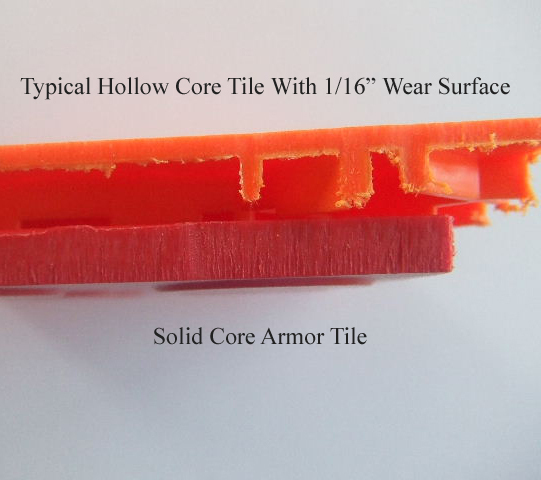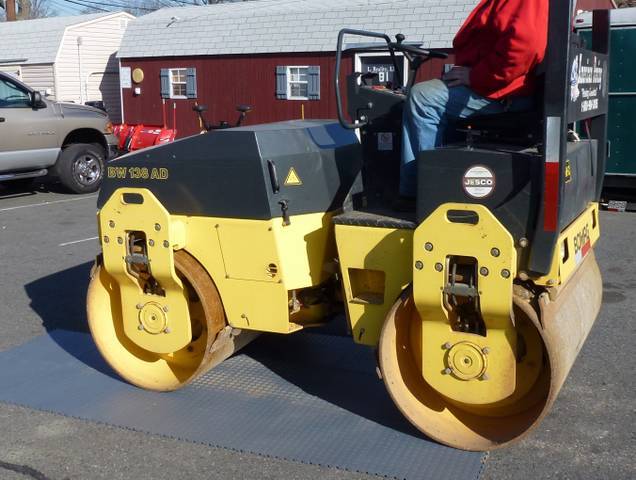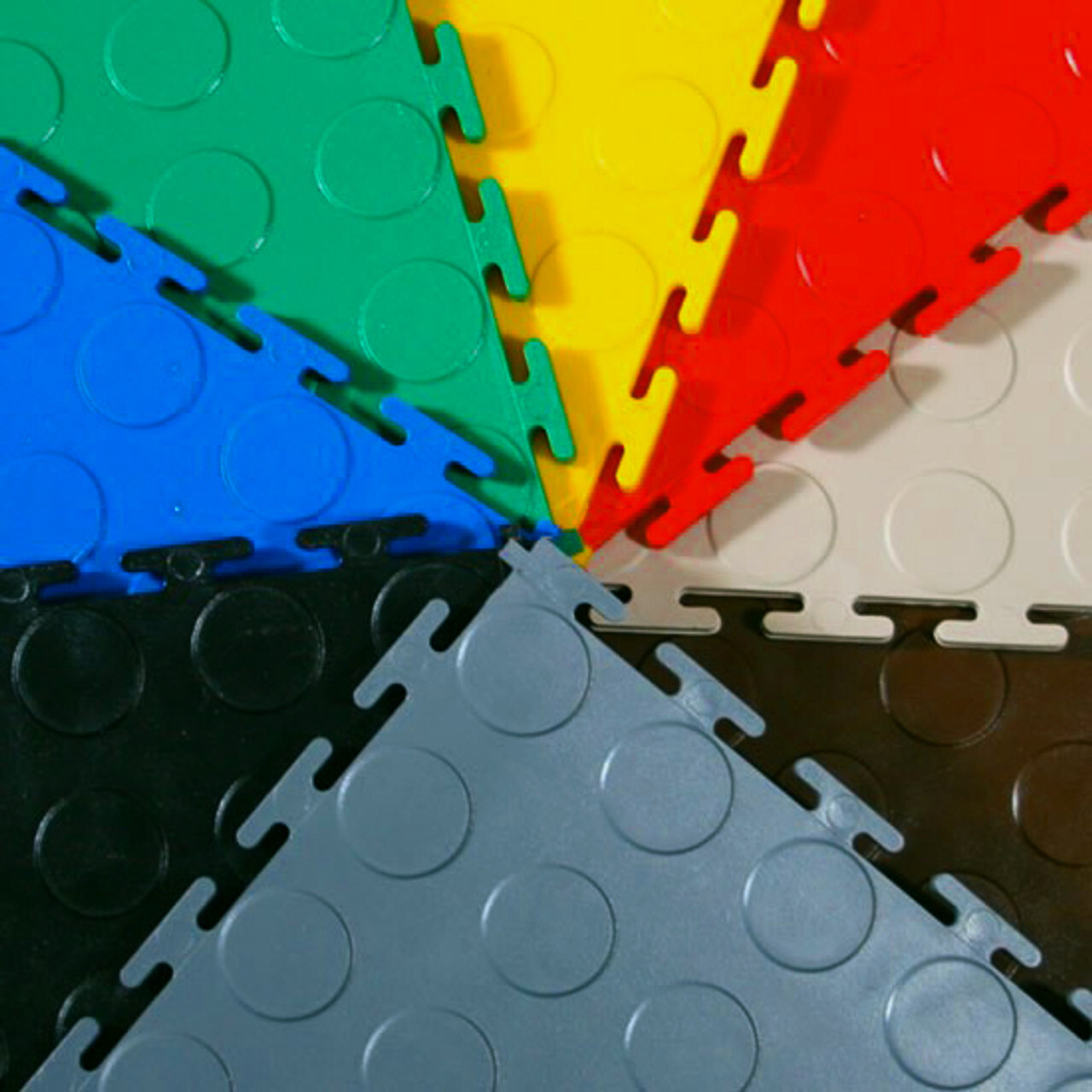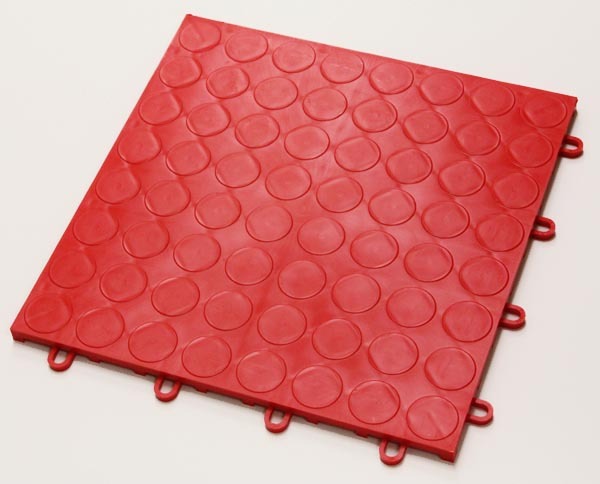What Is The Best Option Garage Floor Option?
Posted by ArmorGarage LLC on Aug 28th 2025
Leaving budget out of the equation, tiles are the best option for garage flooring. The question is which type of tiles are best for garage floor duty. On Reddit, you'll read all sorts of comments on various products, and quite frankly, we scratch our heads on most of them.
Let's go through the options, and then you can decide which you think is best.
We see a lot of people suggesting VCT tiles. If you use the stick-down type of tiles, you'd better make sure you acid etch the floor clean or diamond grind it clean, or the adhesive on the back of the tiles will not stick to the floor properly. Then, at some point in time, your tires will start popping off the floor, most likely under where your hot tires are twisting and turning. Vct tiles are also very slippery when wet, scratch easily, chip easily, and dull very easily. If you glue them down with that black mastic adhesive, you're pretty much stuck with that floor because removing the mastic to put down a new floor is a very difficult job. We don't think VCT tiles are a good idea in a garage.
Next are ceramic tiles. Ceramic tiles are great, but not a great fit for garage duty. You need to install them with at least an inch of mortar or more, which is costly and time-consuming. One of the reasons for installing tile in your garage is the labor-saving factor. Ceramic tiles are very labor-intensive. Then you have the grout issue. Grout is porous. What do you think rainwater dripping off your car is going to do to the grout, especially if you live in an area that uses road salts? What do you think any vehicle fluids will do to the grout? Once the grout is compromised, moisture and contaminants will get in and under the tiles, causing them to come loose and crack. Again, most likely where your tires drive over them. Ceramic is also slippery, chips easily, and requires a lot of maintenance. If you damage one and want to replace it, it's not an easy job. You have to grind out the old tile and mortar and recement a new tile in. Not something you really want to do.
Next, we've read some people suggest outdoor carpeting. We won't waste any time on this.
Next LVT (Luxury Vinyl Tile). They look really nice, but again, they have drawbacks. First of all, your garage floor better be perfectly level. Which means you most likely will have to install a plywood subfloor to get it level. We've been in the garage business for a very long time, and we have yet to see a concrete garage floor that is flat and level. LVT is also on the soft side to the point where pet claws can scratch the finish, and dropped objects can dent them pretty easily. Manufacturers of these types of tiles warn customers not to drag furniture or other heavy objects across the floor. What do they think cars are? They can also be stained easily by vehicle fluids, so you have to clean up any spills right away. They only have a roll-over capacity of 40,000 lbs, which sounds like a lot, but really isn't. Eventually, you will wear tire paths/indents into the floor. Don't use car jacks or jack stands on this type of floor! Replacing one of these tiles is not easy either. So, they look great when first installed but they age very quickly beacuse they only have on average a 25-30 mil wear surface which is thick in the epoxy paint world but thin in the material world. To put that in perspective 25 mils is about 6 sheets of good copy paper. Which again is very thick in the paint and coating worlds but is not much to go on in the material world.
Next are actual garage floor tiles. Garage floor tiles are usually interlocking and come in various types, patterns, and materials. Let's start with polypropylene tiles. They come in perforated or nonperforated versions. They're all hollow core, which means they have a thin wear surface of about 1/16" and then the rest of the thickness is hollow, made up of standing ribs. Polypropylene is made from recycled food containers and soda bottles. Very inexpensive material. Hollow core tiles weigh less than a pound each, so your floor doesn't have much mass when installed and thus is subject to the floor shifting out of place, causing all sorts of problems. They also have flimsy Peg & Loop connectors that do not join each tile together very securely. They frequently break off during installation, and since the tiles are brittle, the Pegs pop in and out of the Loops when you drive over them. Don't forget your floor is not perfectly flat and has high and low spots. As the Pegs & Loops pop in and out of each other, they make what is called tile rattle when you drive on them. They also have a cheap-sounding click-clack noise when you walk over them. In the next section, you'll see the difference between hollow and solid garage tiles.
So now we come to solid garage floor tiles. Solid tiles are just what the name says, they are. Our solid tiles are an average 1/4" thick, made from PVC. PVC is a much higher-quality material than polypropylene. Our tiles weigh on average 4 lbs each, compared to less than a pound for hollow tiles. Our solid tiles have interlocking T-Joints around the full perimeter of each tile, versus 3 or 4 Peg & Loop connectors spaced far apart on hollow tiles. We used to make and sell hollow Peg & Loop tiles but stopped making them due to the issues mentioned above. They would split apart, they would crack at high or low points, and they would often buckle all over the place. So we discontinued making them, we rather not make a sale than have to deal with headaches.
Our solid tiles are impervious to all vehicle fluids and road salts. In fact, you can store road salt on our floors with no issues. They have a 100,000 lb static load rating, which is several orders of magnitude higher than 40,000 lb rollover capacity. Car jacks and jack stands are child's play for our solid tiles.
Here's a comparison of our solid tile and a typical hollow tile.

Pretty easy to see which will last longer. Don't try this with LVT or Hollow Core Tiles

Here's a comparison between our continous locking joints to a Peg & Loop tile

PEG & LOOP TILE

To sum it all up, you can park steamrollers on our tiles, you can use floor jacks, jack stands, and drop engine parts on our floor without worrying about damaging it. Paints and other fluids wipe right off. They're sound-deadening versus popcorn machine-sounding tiles. They won't dent or develop wear grooves. They won't split apart. They're not slippery, and even though they have a hard-wearing surface, they are flexible, so they will conform to the contour of your floor. So, no fatigue cracks at high and low spots, no need to put in a level subfloor. No grout, mortar or black mastic needed. No perforations means no dirt and debris getting under the floor. They're guaranteed for life and will last two lifetimes. If you somehow manage to drop an engine on the floor and damage a tile, it's simple to pop out the damaged tile and pop in a new tile. If you don't have a spare, we'll send you one at no charge.
We hope this helps in your decision process, which is the best option for your garage floor.

